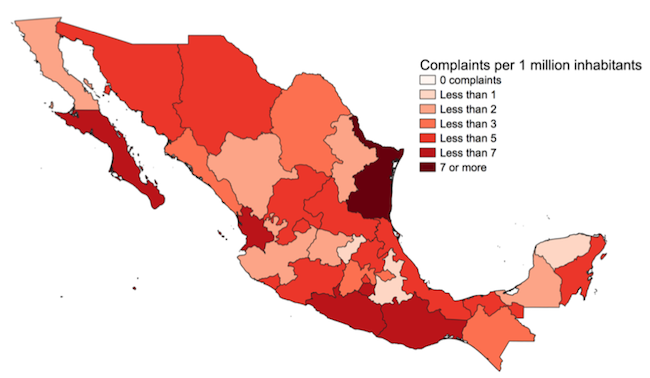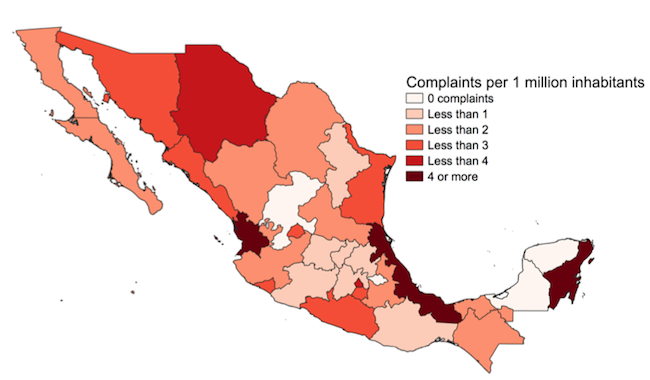
01/30/20- Justice in Mexico, a research-based program at the University of San Diego, released a working paper by Rita E. Kuckertz, entitled, “Forced Confessions: Tracking Torture and Mistreatment in Mexico’s Accusatorial Criminal Justice System.” This study examines the impact of Mexico’s 2008 criminal justice reform on the use of torture and cruel, inhuman, or degrading treatment by judicial sector operators as prosecutorial tools. Specifically, it analyzes how the reform has served to reduce the practice of utilizing torture and mistreatment to extract criminal confessions by imposing new constraints and incentive structures to re-shape the behavior of judicial actors. It employs data from two sources in order to determine whether or not the implementation of the Accusatorial Criminal Justice System (SJPA) has resulted in a reduced incidence of torture and mistreatment by judicial sector personnel. The results suggest that the reform can indeed be credited for small but meaningful reductions in torture, mistreatment, and forced confessions in Mexico.
The author hypothesized that the reform would be associated with decreased levels of torture in the judicial sector. Specifically, this study presumed that high subnational SJPA performance scores would be associated with reduced rates of torture by judicial sector officials in those states. Additionally, it was predicted that following the reform’s municipal implementation, detainee reports of torture and forced confessions would decline at a national level. While this research also hypothesized that states with higher SJPA performance scores would demonstrate greater reductions in reports of torture and forced confessions following implementation, it was not possible to confirm this conclusion due to insufficient data.
Figure 3: CNDH Complaints of Torture and Cruel, Inhuman, or Degrading Treatment against Judicial Sector Operators per 1 Million Inhabitants (Average 2015-2018)

Figure 4: CNDH Complaints of Torture and Cruel, Inhuman, or Degrading Treatment against Judicial Sector Operators per 1 Million Inhabitants (2018)

Data sources: CNDH National Alert System, CONAPO

Still, result of the author partially confirmed the geographic hypothesis outlined above. Annual correlation and regression analyses between state reform performance scores and state-level rates of torture and mistreatment complaints against judicial sector operators did not produce significant associations from 2015 to 2017. However, analyses employing 2018 data yielded a significant relationship between the two variables, suggesting that the reform’s consolidation over time has had a positive impact on human rights in Mexico’s judicial system. Furthermore, insignificant findings from 2015 to 2017 may be explained by factors unrelated to the judicial reform. While it was beyond the scope of the study to identify other variables affecting the relationship during this period, the author hypothesizes that increases in drug war-related enforcement measures may have played a role.
Furthermore, this study’s findings substantiated the temporal hypothesis with regard to torture. A chi-square test for independence revealed a significant reduction in the percentage of detainees that reported being subject to torture following the reform’s implementation at the municipal level. The temporal hypothesis examining forced confessions was partially confirmed, as a second chi-square test for independence revealed a marginally significant decrease in the percentage of sentenced detainees that reported being subject to a forced confession.

Figure 7: Results of Chi-square Test and Descriptive Statistics for Reports of Torture and Mistreatment by Presence of Municipal Reform Implementation at Time of Arrest

Figure 8: Results of Chi-square Test and Descriptive Statistics for Reports of Forced Confessions by Presence of Municipal Reform Implementation at Time of Arrest

Data source: ENPOL

While the observed reductions were relatively small (a 7.4% decrease in torture and a 5% decrease in forced confessions), these results nonetheless represent compelling evidence in favor of the SJPA’s impact on Mexico’s human rights situation. As the SJPA’s official implementation date fairly recently in 2016, there is still much work to be done to fully consolidate the reform’s mandates. As Mexico continues to progress toward the SJPA’s full and effective implementation, researchers should observe further reductions in the incidence of torture by judicial sector officials. This is supported by the results of state-level chi-square tests, which also showed large and significant reductions in the percentage of detainees reporting torture and forced confessions (39% reductions in torture in Baja California and Durango, 24% reduction in torture in Mexico City, 14% reduction in torture in Morelos, a 36% decrease in forced confessions in Mexico City, and an 84% reduction in forced confessions in Querétaro).
The author argues that regardless of these findings, the existing criminal justice reform may not be enough to address the epidemic of torture. Ms. Kuckertz posits that Mexico must also (a) improve official sources of data used to track cases of torture and mistreatment, allowing researchers to monitor the success of state efforts to reduce the practice; (b) explicitly and publicly condemn the practice, instituting appropriately severe penalties for those found guilty of such crimes; (c) establish strong protections for detainees and their families, banning the practice of detention without charge, or arraigo; and lastly, (d) remain steadfast in defending the criminal justice reforms amidst growing calls to revert to familiar judicial practices characteristic of one-party rule in Mexico. While these proposals are tied to Mexico’s broader challenges in addressing corruption, impunity, and capacity issues, they represent crucial steps toward the country’s democratic consolidation and the establishment of institutions that respect its citizens’ human rights.

About the Author:
Rita E. Kuckertz earned her Bachelor’s degree in Psychology and Spanish with an emphasis in Latin American Studies from the University of San Diego in 2015. She is currently a candidate for the Master’s degree in International Relations, also from the University of San Diego. Her research primarily focuses on human rights and judicial reform in Latin America, with a particular emphasis on Mexico. She has served as Program Assistant and Operations Coordinator at Justice in Mexico for over four years.





